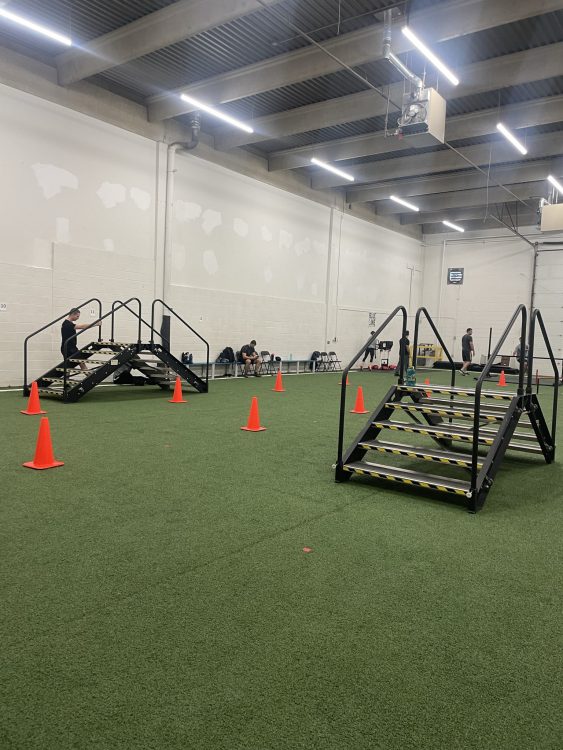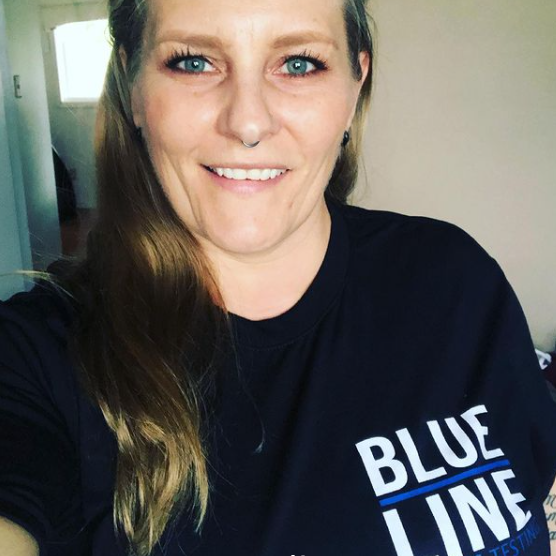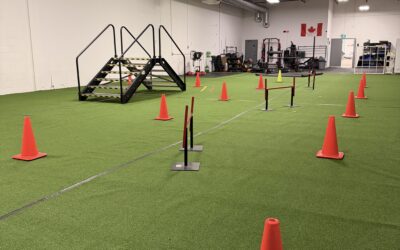
If you’re considering a career in law enforcement, the process to become a police officer in Alberta is rigorous and rewarding. In this blog, we’ll guide you through the recruitment process for common police forces in Alberta such as the Edmonton Police Service (EPS) and Calgary Police Service (CPS) and provide tips for excelling at each stage. Whether you’re just starting your journey or looking for specialized support, Blue Line Fitness Testing can help you succeed.
Step 1: Research the Role
Before applying, ensure you fully understand the responsibilities, duties and shift work needs of a police officer. This includes maintaining public safety, dangerous and potentially traumatic work, enforcing laws fairly and equally, and building trust within the community on a 24 hour, 7 days a week basis. Shift work alone can be demanding and hard on relationships and families and may be something you need to consider, especially if you have children. Add in the stress of dealing with sometimes horrific situations and you will want to ensure you have the resiliency and support network to help you survive and thrive in this career.
Police officers face numerous different situations daily and must react on a split second basis regularly, all while the public video their every move and action they take. Take this into consideration when you are looking into a role as a law enforcement officer.
How to Prepare:
- Attend EPS recruitment information sessions to gain insight into the role.
- Read up on and research the daily duties of officers and decide if your values align with the career.
- Schedule a ride along (if available) to see first hand what police work is.
Step 2: Meet Basic Eligibility Requirements
Applicants must meet the following criteria:
- Age: You must be 18 years of age or older at the time of application.
- Criminal Conviction: You must not have a criminal conviction for which a pardon has not been granted.
- Citizenship: You must be a Canadian citizen or legal permanent resident at the time of application.
- Physical and Health Standards
- You must be in excellent health with no impending conditions.
- You must meet visual and hearing examination standards.
- You should be prepared to pass the physical readiness evaluation is a component of the process. Learn more on fitness requirements & programs like Run with Recruiters.
- Education and Employment
- You must hold a Grade 12 high school diploma (Alberta standard) or equivalent; for International Applicants, an IQAS certificate or WES certificate is required.
- You must possess good written and verbal skills in English. Written communication testing will be included in the selection process.
- EPS recommends applicants have two years of recent and verifiable employment, and/or two years of post-secondary education.
- Other Certifications
- You must possess a valid Alberta Class 5 driver’s license. A graduated driver’s license is not acceptable.
- A good driving record is essential (maximum of five demerits). You must be comfortable operating a vehicle in busy driving conditions.
- You must possess a current certificate in standard first aid.
- Must be a minimum 16-hour course with Provincial Occupational Health and Safety approval. A certificate must be issued within one year prior to the date of application. Re-qualification may be necessary for some components after one year.
- A current “Level C” certificate in cardiopulmonary resuscitation (CPR/AED)
Tip: Ensure your documents are up to date before starting the application process and don’t leave your fitness preparation to the last minute or last thing you do!! This is where most people fail out of the process. You don’t need a policing background to become a police officer. Every year people are hired acrosss Alberta from a wide variety of educational, geographical, and cultural backgrounds. The one quality recruits should all have in common is the desire to serve the citizens of their communities.
Step 3: Submit an Online Application
Most Alberta police agencies use an online platform to accept applications. The EPS accepts applications online through a provincial-wide application system – APATS. To begin the application process, applicants will need to create an APATS account and then apply to the Edmonton Police Service constable job posting.
Completing the online application is a time-consuming process, and it is recommended you take your time to be accurate, and thorough and try not to finish applying in one session. The system allows you to log in and out as many times as you need to complete it.
Once submitted, your application will be pre-screened to ensure it is complete and that you meet the minimum requirements. If you pass pre-screening, you will be notified and will move to the next stage of the selection process. If your application is not complete, a member of the Recruiting and Selection Unit will contact you about any missing material or outstanding issues.
Note: Applications are valid for one year from the date of submission. If you have been out of the application and selection process beyond one year, you are required to submit a new application. Applicants may be deferred without appeal at any of the eight stages in the selection process. In some cases, permanent disqualification from reapplication may occur irrespective of deferral policy.
How to Prepare:
- Complete your application from a desktop or laptop computer, not a mobile phone.
- Highlight any volunteer work, leadership roles, or experience in high-stress environments.
- Tailor your resume/application to emphasize transferable skills such as communication, teamwork, and decision-making.
Step 4: Written Testing
After submission of a complete application package, suitable applicants will be contacted to schedule the testing date for the Alberta Police Cognitive Ability Test (APCAT). The APCAT is a critical thinking exam that tests one’s potential to successfully complete police recruit training and perform effectively as a police officer in the Province of Alberta. The APCAT does not measure your knowledge of a particular subject, but rather your ability to think and reason.
The APCAT is a formal test and your professionalism will be assessed at this stage and every subsequent stage thereafter. Make sure to arrive on time (we suggest 5-10 minutes early) and dress in appropriate business attire.
The exam is approximately 3 hours in length, consisting of 120 multiple-choice questions. Attendees must achieve a score of 70% or higher to pass.
There is no limit on exam attempts, however, minimum wait periods apply as detailed below:
1st test write fail – applicant must wait one month before rewriting.
2nd test write fail – applicant must wait three months before rewriting.
3rd and subsequent test write fail – applicant must wait six months before rewriting.
How to Prepare:
- Practice sample police aptitude tests, which are often available online.
- Brush up on reading comprehension, basic math, and situational judgment.
Step 5: APREP Fitness Test
The Alberta Physical Readiness Evaluation for Police (APREP) is a crucial part of the selection process and is where a majority of applicants fall short due to lack of fitness or lack of preparation. It assesses your physical ability to perform job-related tasks.
Components of the APREP:
- Obstacle Course: Tests agility, endurance, and strength.
- Push-Pull Machine: Evaluates upper body strength and stamina.
- Grip Strength Test: Measures overall physical readiness.
- Leger/Beep Test Shuttle Run: Measures your cardiovascular fitness and endurance.
How Blue Line Fitness Testing Can Help:
- Personalized Training Programs: We tailor workouts to improve your endurance, strength, and agility.
- Mock APREP Testing: Familiarize yourself with the course layout and expectations in a supportive environment.
- Expert Guidance: Our trainers, like Phil Moreau, specialize in preparing clients for the APREP. We have helped numerous applicants ace their APREP and make it to recruit training.
👉 Read more about the APREP fitness test and how to train for it here.

Step 6: Behavioural Descriptive Interview (BDI)
During this interview recruiters will assess your judgment, decision-making skills, and understanding of ethical behavior. The EPS interviews and tests applicants around six competencies a patrol constable must possess to function in their position. A series of behavioural questions, related to experiences or events in the applicant’s past, are designed to evaluate the six competencies:
Valuing service and diversity
Adaptability/decisiveness
Initiative/perseverance
Interpersonal skills
Organizational skills
Stress management
How to Prepare:
- Use the STAR (Situation, Task, Action, Result) method to structure your responses. Be specific in your answers and what you did, not what your partner or co-worker did.
- Practice mock interviews with friends or professionals.
At Blue Line, we offer Interview Preparation Services to help you feel confident and ready for the big day.
Step 7: Personal Disclosure Interview (pdi)
The personal disclosure interview (PDI) is a one-on-one interview conducted by the recruiting members. During this interview (that can last up to 3 hours), the applicant’s application and personal disclosure form will be reviewed and discussed. As with all stages of the process, the applicant’s honesty is vital.
Recruiters and police agencies understand that circumstances and decisions in the past have lead to difficult situations, however it’s extremely important candidates are truthful about their previous choices and actions during the entirety of the application process. Lying at any point in the process can be means for immediate removal from the process and can lead to a lifetime deferral from the police agency you are applying to.
STEP 8: Polygraph Interview
All applicants participate in a polygraph interview as part of the selection process. The purpose of the pre-employment polygraph examination is to prevent infiltration and/or corruption within the police service you are applying to. This means being 100% truthful throughout the entire application process (i.e. information supplied on the Personal Disclosure Form and responses given during the PDI). If an applicant has made a mistake, or a misstatement on their employment application, or when they have additional disclosure(s) or new information, they should inform their file manager or polygraph examiner prior to the in-test portion of the pre-employment polygraph examination.
Most applicants are curious about the pre-employment polygraph examination procedure and will seek out information prior to attending their scheduled appointment. It’s important for applicants to recognize there is much misinformation and disinformation regarding the use of polygraphs specifically as part of a hiring process, the accuracy of the results, and what applicants should/should not do during their pre-employment polygraph procedure. Misinformation and bad advice account for some applicants not successfully completing this stage. The polygraph examiner will openly discuss any or all these sources of information with the applicant prior to the in-test portion of the procedure and ensure that each applicant is fully informed and set up for success.
Most applicants become nervous, anxious or apprehensive when they are asked to submit to a pre-employment polygraph examination. This is normal and will NOT affect the results in any way. The examiner will answer all questions the applicant may have prior to conducting the in-test portion of the procedure. Applicants are encouraged to discuss and/or explain any issues that cause them concern. The examiner will review the test questions and answers with the applicant prior to the in-test portion of the procedure. The polygraph examiner will ensure that each applicant is very well prepared for their pre-employment polygraph.
Tip: Ensure you maintain a normal routine prior to attending; ie: taking prescriptions as prescribed, adequate rest, nutrition, and consuming normal quantities of coffee/tea. The procedure takes approximately 4-6 hours.
Some helpful resources below:
Canadian Association of Police Polygraphists
American Polygraph Association
Step 9: Medical and Psychological Testing
Applicants must pass a medical evaluation and psychological assessment to ensure they’re fit for the demands of the role.
Psychological Examination
Candidates will undergo two multiple-choice computer-based psychological tests administered on-site:
the Inwald Personality Inventory-2 (IPI-2) Assessment
the 16PF (Personality Factors) Questionnaire
The tests are followed by a clinical interview by a contracted psychologist. During this interview, applicants will have an opportunity to further explain their answers to questions that may have been flagged by the recruiters as questionable responses.
Medical Examination
Applicants undergo a thorough medical examination by a physician contracted through their police agency. Applicants are required to provide an up-to-date immunization record.
How to Prepare:
- Maintain a healthy lifestyle with proper nutrition, exercise, and stress management.
- Prioritize sleep and mindfulness to support mental health.
Step 10: Background Investigation
This stage is the final step in the selection process. A thorough background investigation including social media accounts, enhanced security and credit checks are undertaken on the applicant and the applicant’s spouse/common-law partner/significant other.
How to Prepare:
Be honest and transparent during the application process.
Clean up your social media accounts to reflect professionalism.
If an applicant has any previous police training or has served as an employee in any law or by-law enforcement agency, they are required to submit the following:
- All internal affairs checks (past, present, and pending complaints)
- Annual performance reviews
- Training records
Upon successful completion of the selection phase, applicants are issued a score based on their progress through each stage of the testing. The applicant’s file is then submitted to a review committee that determines whether the applicant is to be offered employment. The applicant’s file manager will contact the applicant with the committee’s decision.
Why Choose Blue Line Fitness Testing?
At Blue Line, we’re committed to supporting your law enforcement journey from start to finish. Whether you’re training for the APREP or need help with mock interviews, our personalized programs are designed to help you succeed.
Additional Resources:
- How to Train for Law Enforcement Fitness Tests Read here.
- Fitness Training for Tactical Situations: What You Need to Know Read here.
- Benefits of Mock Fitness Testing Before the Big Day Read here.
Pursuing a career as a police officer is a challenging yet fulfilling journey. With proper preparation and support, you can confidently tackle each stage of the recruitment process. Let Blue Line Fitness Testing help you take the next step toward serving your community.
Ready to Get Started?
Visit our website to book your APREP prep session or reach out for personalized coaching today!







